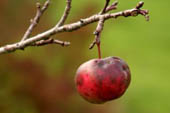
Purpose
To determine which factor speeds up the decomposition in fruits and vegetables – air and light or complete darkness with stagnant air.
Additional information
Many people enjoy making compost piles to help fertilize their plants and aid the environment. In the majority of cases, compost piles take quite a bit of time to create as you have to wait for several days or weeks for the pile to decompose. This experiment can help determine how someone can speed up the decomposition of their compost pile.
Sponsored Links
Required materials
- Cardboard box/li>
- 2 Styrofoam plates (Styrofoam does not decompose)/li>
- Black paint /li>
- Paintbrush /li>
- Newspaper/li>
- 2 apples, cut in slices/li>
- 2 zucchini, cut in slices/li>
- Notebook/li>
- Camera, if you have one
Estimated Experiment Time
Several weeks.
Step-By-Step Procedure
- 1. Begin by laying newspaper out on the grass in your yard or pavement. Set up the black paint and the box out on the newspaper and paint the inside of the box black. Make sure there are no holes in the box and let the paint dry for at least a few hours before proceeding.
- 2. While the paint is drying, cut up the apple and zucchini slices. Divide them evenly into two groups and place them each on their own Styrofoam plate.
- 3. When the box is finished drying, take it and place it over one plate of apples and one plate of zucchini in an area where it will not get disturbed.
- 4. Place the other two plates of apples and zucchini in an area where there is lots of air and sunlight, such as by a window, but where it will not get disturbed.
- 5. Let the plates of food begin to decompose. Take pictures if you can and record details about how quickly each plate of food is decomposing.
Note
Take care when cutting the apple and zucchini slices. Younger audiences should have an adult cut the the apple and zucchini for them.
Observation
When making your observations, make sure you are as detailed as possible about how the food looks, feels and smells as well as how quickly each set of food is decomposing.
Result
Generally, the food in the box will decompose faster than the food that is exposed to air and light. Bacteria are what decompose food and light and air will kill many bacteria, but not all of them. Bacteria will thrive in a warm, dark environment, therefore decomposing the food that is not exposed to light and air faster.
Sponsored Links
Take a moment to visit our table of Periodic Elements page where you can get an in-depth view of all the elements,
complete with the industry first side-by-side element comparisons!